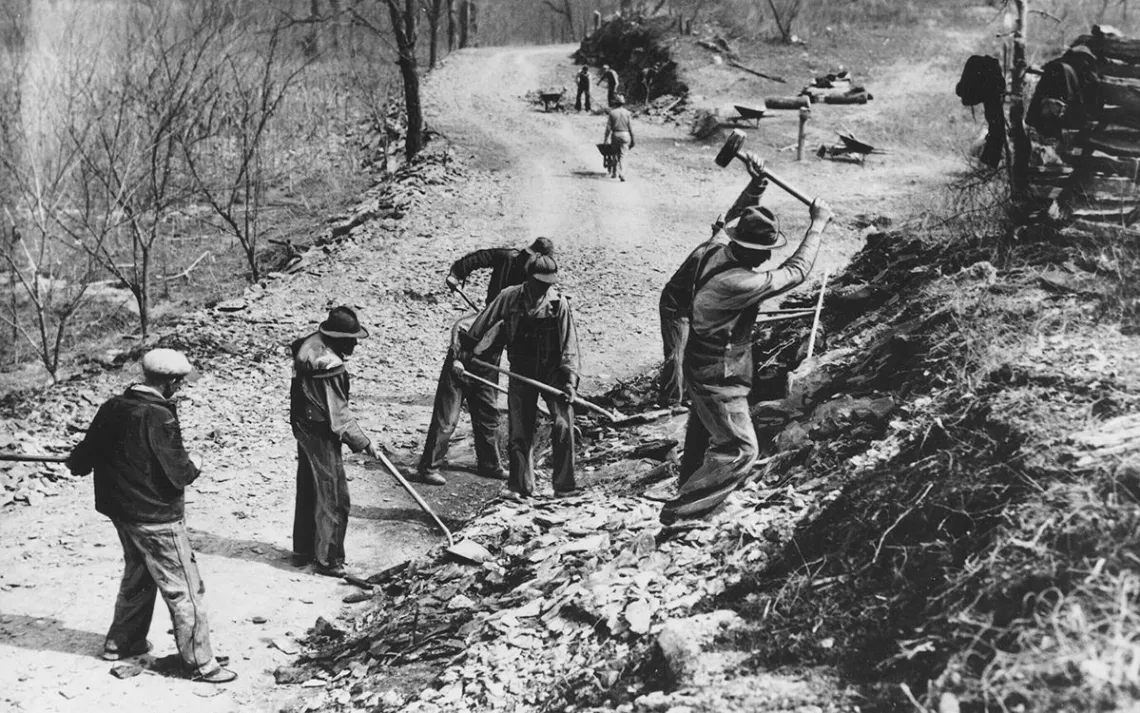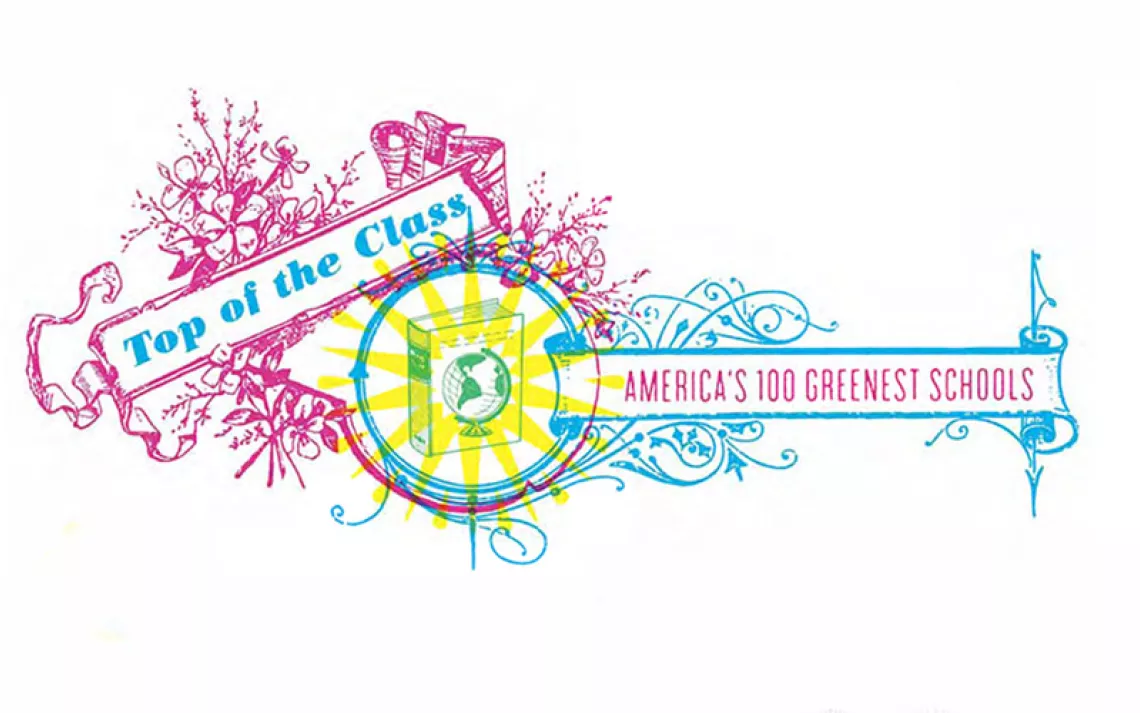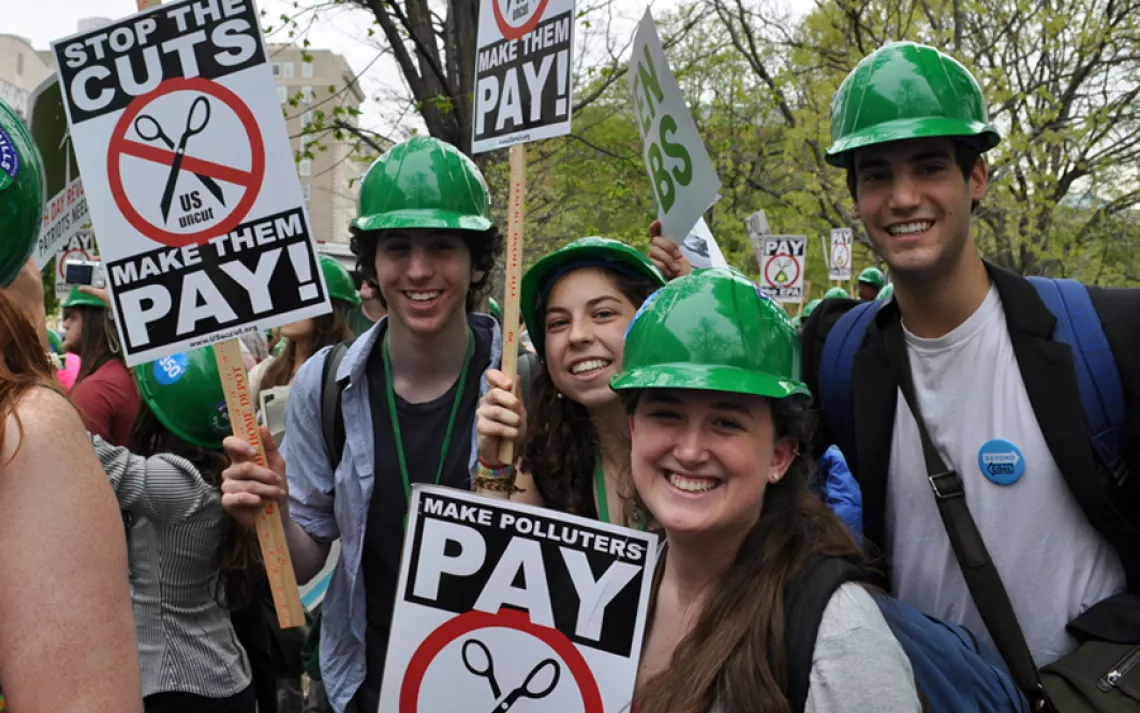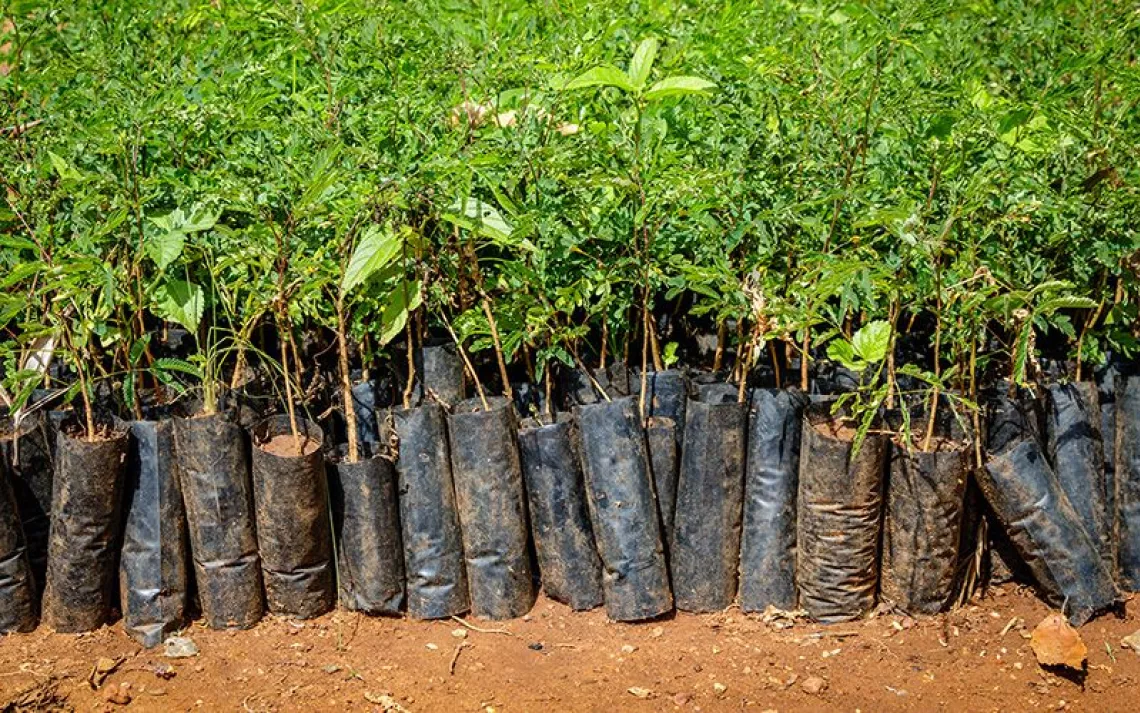Meet Young People Shirking College to Volunteer on Wild Lands
Could the pandemic normalize the gap year—and help save public lands?

New Deal Works Progress Administration (WPA) programs were designed to provide wages, and to remake society. | Photo courtesy of Detroit News/AP
Melinda Espinoza was helping to clear out a drainage ditch in Santa Fe, New Mexico, a few months ago when she had a revelation. The 18-year-old had lived in the city her entire life without ever noticing that just behind its historic downtown was something akin to a jungle. She gets that her example is funny—who has an epiphany about a drainage ditch?—but the gap year Espinoza has taken due to COVID-19 has been marked by similarly strange discoveries about a place she thought she knew intimately.
Although she originally planned to attend San Diego University this year, Espinoza didn’t want to relive the isolation and boredom that characterized the end of her high school experience. Rather than be confined to a dorm room, she deferred and enrolled in a group called YouthWorks, an AmeriCorps service program that has her performing physical labor, mostly in public and wild lands. Instead of studying sports psychology, she now has a 9-to-5 job removing invasive species and cutting down elm trees with chainsaws. “At a time when people are being more selfish, I wanted to give back,” Espinoza told Sierra. “This is just more meaningful than doing online classes, and it gives me a completely different perspective than what I’m used to.”
These are all tasks Espinoza hadn’t imagined herself performing, never mind with people she describes as well outside of her “age bubble.” But as is the case with many young Americans, concerns over contracting the coronavirus have forced Espinoza to reconsider her five-year plan. A survey conducted by Hart Research between April 29 and May 5 found that 61 percent of current college students are now interested in a public service program, and Samantha Jo Warfield, a spokesperson at the Corporation for National and Community Service, says applications over the summer were up by 25 to 40 percent compared with last year. “We’ve had a tremendous uptick,” she told Sierra. “I think the word one of our recruiters used when I asked last month was ‘exploding.’”
To people like Espinoza, working outside seems like a safe bet when so much else is uncertain. And in a way, the massive economic disruption caused by COVID-19 may be just what some activists have been waiting for. Just before my senior year of college, I volunteered with AmeriCorps to help rebuild trails in one of the country's most far-flung and least-visited national parks. There was no cellphone service on the outskirts of Baker, Nevada, where I lived in my one-person tent. The only people I spoke to the entire summer were gun-hoarding libertarian types, Park Service employees, and other Great Basin National Park volunteers. I still think about the experience as a rite of passage—to this day, I've never had to cooperate with such a politically and socioeconomically diverse group of people in any working environment. I suspect I never will.
That was in 2010, and a bipartisan movement composed of people who think participation in national service programs should be all but mandatory started gaining traction shortly thereafter. In 2013, the conservative CATO Institute published a paper arguing for “universal”—though not compulsory—national service. The following year, General Stanley McChrystal wrote about the need for a “common experience of citizenship” at a time when we are “drifting apart.” Google searches for “mandatory national service” spiked in 2017. As part of his campaign for the Democratic nomination, Pete Buttigieg suggested making public service a “social norm” on a mainstream news channel, and in March, a commission started by Senators John McCain and Jack Reed released a report recommending that the country’s service infrastructure be expanded to accommodate 1 million people by 2031. (It only supports about 80,000 federally supported, yearlong opportunities today.)
The report got almost no media coverage, as its release coincided with a global health crisis. Yet, the pandemic and subsequent economic shutdown in many ways renders its prognosis more relevant than ever. After all, one explanation for the coronavirus's spread in America is an individualistic rather than community-oriented mindset, and people like Espinoza report that AmeriCorps sparked a new appreciation for teamwork. “While doing conservation corps, you are just totally opened up to how other people think or do things,” agrees Katie DiAngelus, who is working with a conservation group in Utah during the pandemic. “You think your way might be the only way, but it turns out there’s five other ways of doing it.”
DiAngelus, who is 27, grew up in suburban Philadelphia without much access to nature. Although she enjoyed camping when she could, she really got the bug after conducting some field research in West Africa as part of a college program. “I remember biking around after I got home and thinking, ‘There’s so much pavement everywhere. I need to go somewhere more green. I also need to explore more of my own country,’” she says.
The Canyon Country Youth Corps allowed her to do just that. Although she was slated to begin more of an office job with the Great Basin Institute this summer, DiAngelus stayed with CCYC for another season to continue working outside. She’s now one of the 12,000 corps members conducting crucial disaster relief, such as delivering food to Native American reservations, and gaining further appreciation for how different cultures in the area—from the cowboys to the Native Americans to the #vanlife Instagram influencers—commingle. No matter what she does next, she says she’ll consider her AmeriCorps experience a crucial time in her life. “We don’t really have many rites of passage in our culture,” she says. “It’s a humbling experience and a good way to grow.”
Besides instilling a sense of common purpose among the country’s young people, a push toward public service could also inculcate an appreciation for maintaining our country’s public lands at a time when the national park system faces a deferred maintenance backlog estimated at $11 billion. As someone who grew up in the suburbs, my three-month camping trip was also my first. And it began what I believe will be a lifelong relationship with the outdoors.
Rosemary Michael-Trumball feels the same way. She had already volunteered with AmeriCorps the summer before her junior year of college at George Fox University. But then COVID-19 hit. The only thing standing between the 22-year-old and a physical therapy degree were some science classes that seemed worthless to take without an in-person lab component. So, she decided to enlist again, and after an eye-opening experience going out on four-day hitches around the Arkansas River, she has now decided to change her career trajectory toward something involving national parks—or organizing future volunteers there.
“AmeriCorps was actually my first time really camping,” she says. “I’d only really seen Colorado Springs and the surrounding areas, but now I can appreciate more of the natural world and the state where I grew up. Even when I’m not working, I go out with friends and hike on trails and can say, ‘Not only have I hiked here before, I worked here.’ It’s an amazing feeling.”
 The Magazine of The Sierra Club
The Magazine of The Sierra Club



